BY FRED GUTERL
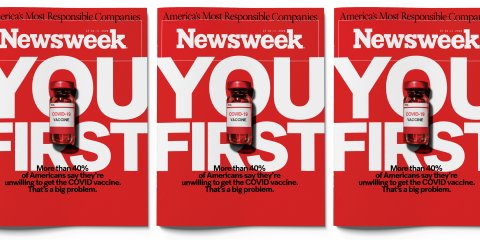 For all the flak that President Trump has taken over the federal government's response, or lack thereof, to the coronavirus pandemic, the government's vaccine development project, Operation Warp Speed, looks like a winner. According to Pfizer, its vaccine prevented COVID in 95 percent of participants in its clinical trials, which are now complete. Moderna's vaccine, which got $1 billion in U.S. government support, prevents 94 percent of cases, the company said.
For all the flak that President Trump has taken over the federal government's response, or lack thereof, to the coronavirus pandemic, the government's vaccine development project, Operation Warp Speed, looks like a winner. According to Pfizer, its vaccine prevented COVID in 95 percent of participants in its clinical trials, which are now complete. Moderna's vaccine, which got $1 billion in U.S. government support, prevents 94 percent of cases, the company said.It would be hard to exaggerate the degree to which experts have been surprised, and relieved, by these preliminary results. Early in the pandemic, conventional wisdom held that the best we could hope for was a slightly better hit rate than seasonal influenza vaccines, which in a good year protect 50 to 60 percent of those inoculated; the Food and Drug Administration set the target for COVID vaccines at a modest 50 percent. Now we have two vaccines that, in theory, are powerful enough to stop the pandemic in its tracks.
Theory, of course, is always cleaner than reality. As the Pfizer vaccine wends its way through a fast-track approval process and the company prepares to ship millions of doses in December, health officials face a public that is skittish about the safety of the vaccines they will soon be asked to receive. Convincing millions of people to report to their doctor's office or pharmacy for an injection of a lab-made genetic substance that has never before been used in a vaccine, and which was rushed from discovery to market in under a year, would not be easy in the best of circumstances—and these, all would agree, are far from the best of circumstances.
In our toxic political culture, the pandemic has cleaved the nation in two halves—those who believe in masks and Dr. Fauci and those who believe in personal liberty and President Trump. Acceptance of a potential COVID vaccine tends to split along partisan lines; in polls, Democrats are more likely than Republicans to say they'd get a COVID vaccine.
The anti-vax movement, on the other hand, which bears some responsibility for outbreaks of measles, mumps and whooping cough in the past two decades, is non-partisan. Libertarians are less suspicious of the vaccine's safety than of government mandates. Some Christians reject vaccinations because they believe the pandemic is part of the end times. Other Americans aren't driven by ideology: They'd simply rather wait and let other people be the guinea pigs—just in case. These disparate streams converge into a wave of skepticism and resistance.
The coronavirus pandemic has been fertile ground for the anti-vax movement, which has gained eight million followers since the start of the year, according to the Centre for Countering Digital Hate. Anti-vaxxers now number 58 million on social media, including 31 million on Facebook and 17 million on YouTube, and account for about $1 billion in revenue, says the Centre. That includes The World Mercury Project, headed by Robert F. Kennedy, Jr., and Stop Mandatory Vaccination.
"They're turning us into transhuman hybrids!" said one Facebook anti-vaxxer in reference to biotech-made COVID vaccines. "What You Need to Know About COVID-19 Vaccine and The Mark of the Beast!" screamed another.
Polls have shown that public confidence in vaccines, which were low at the beginning of the pandemic, dropped as the outbreak continued over the summer and into the election season. About two-thirds of Americans said they would agree to be vaccinated in June, according to Gallup. By September, as Trump stepped up his pressure on the medical establishment to release good news about vaccines before election day, that figure dropped to 50 percent. The latest figures, released on Tuesday by Gallup from polls taken before the election, 58 percent of adults said they'd be willing to take a vaccine. A poll by ClearPath Strategies found that only 38 percent of respondents would be willing to take a vaccine within the first three months after it became available.
These numbers suggest that public opinion is teetering and, if it moves in the wrong direction, could threaten the vaccine roll out. To stop the pandemic, Dr. Anthony Fauci, the nation's top infectious disease official, estimates that at least three of four people would need to take a vaccine, preferably 85 percent.
"If 50 percent of people don't take it, you still have a considerable public health challenge," Fauci said on the New York Times Deal Book webcast. Judging from the polls, getting to 75 percent would require convincing about 50 million vaccine-hesitant people to change their minds. "To say that's going to be a simple task is avoiding reality," he added. "This is going to be a difficult task."
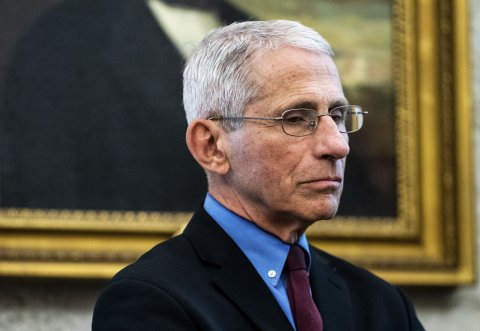
Dr. Anthony Fauci, director of the National Institute of Allergy and Infectious Diseases, estimates three out of four Americans, and preferably 85 percent, need to take the COVID vaccine in order to stop the pandemic.ERIN SCHAFF/THE NEW YORK TIMES/BLOOMBERG/GETTY
Experts hope that these numbers rise again as the public digests the recent hopeful news. To vanquish the pandemic quickly, however, the numbers will have to rise dramatically and stay high, in the face of significant headwinds. Any gains in confidence could easily be offset by any of a number of causes: continuing political tensions over the election, particularly if the transition to a Biden administration remains stalled; hiccups in manufacturing that delay the delivery of vaccines; adverse reactions from a vaccine, real or perceived; or rising conspiracy theories that cast doubt on vaccine safety.
What has many experts worried is that the federal government has undertaken no large-scale public information campaign to off- set the vicissitudes of public opinion. The Trump administration deserves credit, they say, for the success of Operation Warp Speed, particularly in the logistics—since manufacturing has proceeded in parallel with clinical trials, millions of doses of vaccines are expected to be available before the end of the year. But the government has neglected to put in place a plan for rolling out hundreds of millions of doses of COVID vaccines in a short span of time that includes managing the fears and expectations of the public.
Even as it successfully fast-tracked vaccines, the Trump administration poisoned trust in the nation's medical establishment: by promoting phony cures like hydroxychloroquine, by browbeating the Food and Drug Administration into exaggerating the effectiveness of blood plasma, by pressuring pharmaceutical firms and the FDA to release good news about vaccines before the election.
Now, as vaccines are about to start shipping, the nation has plenty of political turmoil, but no communications plan. "We should have started talking about this in March or April," says Saad Omer, director of the Yale Institute for Global Health. "Now we have a once-in-a-generation public health emergency, and we don't have an actual campaign to match the moment."
"If you're a pilot," he adds, "you don't start making your flight plan after take off."
The lack of a strong national campaign leaves an information vacuum. Something will fill it—but what?
Live Free or Die
Resistance to a COVID vaccine has its roots in an anti-vax movement that began more than two decades ago. In 1998, Andrew Wakefield published a study in The Lancet, a leading medical journal, claiming to have established a link between autism and vaccines. The study proved flawed. Its central problem is that the two events Wakefield studied—vaccines and the onset of autism—generally happened at about age 2; Wakefield mistook coincidence for causation.
The Lancet eventually retracted the paper, but Wakefield was unrepentant. Despite having his medical license revoked, he continued to champion a causal link between vaccines and autism. He set in motion a movement of parents concerned about the safety of child vaccinations.
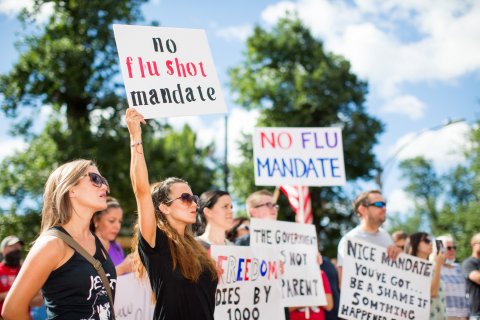 Anti-vaccine activists hold signs in front of the Massachusetts State House during a protest against Governor Charlie Baker's mandate that all Massachusetts school students enrolled in child care, pre-school, K-12, and post-secondary institutions must receive the flu vaccine this year on August 30, 2020 in Boston, Massachusetts.SCOTT EISEN/GETTY
Anti-vaccine activists hold signs in front of the Massachusetts State House during a protest against Governor Charlie Baker's mandate that all Massachusetts school students enrolled in child care, pre-school, K-12, and post-secondary institutions must receive the flu vaccine this year on August 30, 2020 in Boston, Massachusetts.SCOTT EISEN/GETTYIn 2014, however, the movement took a decisive turn. A measles outbreak at Disneyland in California prompted the state legislature to pass a bill, SB277, that removed religious and philosophical exemptions from vaccine requirements for schools and daycare centers. The move coincided with the release of the pseudo-documentary Vaxxed, directed by Wakefield, about an alleged conspiracy at the CDC to cover up the link between autism and vaccines. The bill and the movie led to a backlash of people concerned about government intrusion on their civil liberties. In 2019, Georgia legislators added fuel to the fire by introducing a bill to allow older teenagers to be vaccinated without their parents' consent.
The Disneyland affair spawned a new strain of vaccine resistance, focused on civil liberties. If this sounds familiar, it is: The same rationale inspires much of the resistance to wearing masks and other measures to constrain the COVID outbreak.
In the midst of the pandemic, the civil liberties rationale has been particularly difficult for health officials to counter. They tend to muster scientific arguments filled with data on reproductive numbers, positivity rates and asymptomatic carriers that don't address what people are truly concerned about.
"When people are emphasizing, 'well, it's my choice, it's my freedom,' it means that they're not actually interested in talking about the science," says David Broniatowski, a professor at George Washington University who studies risk and decision making. "They're not interested in engaging in issues of fact. It becomes engagement in issues of values. That's a dangerous road to go down."
The problem is compounded by perfectly rational concerns over the safety of vaccines made with unprecedented speed and with new technology in general. Public health officials are asking the public, in a year in which the most mundane aspects of medicine and public health have been politicized, to trust them.
In the context of civil liberties, mandating vaccination, as some politicians have proposed, is likely to elicit a powerful backlash and should probably be used only as a last resort. "It may be that the only way to get the pandemic under control is to mandate vaccination," says Broniatowski. "But that would be a failure of the democratic process. It would be much better if we could convince people to take it of their own free will."
An Undercurrent of Conspiracy
The tumultuous pandemic year has proven to be fertile ground for conspiracy theories. Many of them are retreads. During the Zika virus outbreak in 2015, one theory emerged that the virus was a ruse to cover birth defects from a pesticide made by Monsanto. More recently, Bill Gates, who finances vaccine programs through his foundation, has been alleged to have created and patented the virus for use in mind control. The Plandemic videos earlier this year spun similar theories of dark plots.
One vulnerability of the Pfizer and Moderna vaccines, from the standpoint of public relations, is that the technology they use smacks superficially of genetic manipulation; thus they have picked up some flak from the anti-GMO movement, which resists genetically-modified organisms in food. Most conventional vaccines work by using a protein common to the target virus to trick the body's immune system into making antibodies. Instead of a protein, the Pfizer and Moderna vaccines use messenger RNA, a type of genetic material, which delegates to the body's cells the job of making the decoy protein—in the case of SARS-Cov-2 virus, the infamous spike protein that allows the virus to infect human cells. The use of mRNA is a big reason scientists were able to develop the vaccines so quickly.
It's reasonable to have doubts about the safety of new bio-technology, of course—particularly when someone wants to inject it into you, your family, friends and the nation's 300 million citizens. Medical experts point to the unprecedented size of the clinical trials being used to test these vaccines, which have involved, in the case of Moderna and Pfizer, more than 60,000 people.
These trials, though, would not necessarily uncover all the problems that vaccines might entail when given to tens or hundreds of millions of people. Health officials can point to data and history, but in the end they are asking people to take some risk. There's no real-world experience to confirm the safety of these vaccines established in clinical trials.
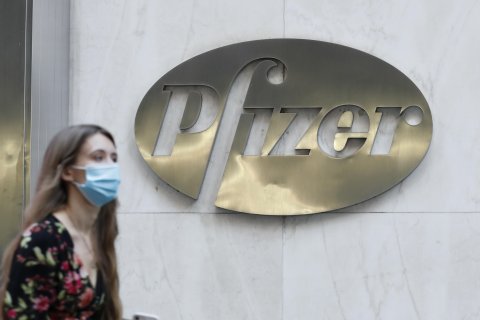 Clinical trials for both the Pfizer and Moderna vaccines have involved some 60,000 people, an unprecedented size.LIAO PAN/CHINA NEWS SERVICE/GETTY
Clinical trials for both the Pfizer and Moderna vaccines have involved some 60,000 people, an unprecedented size.LIAO PAN/CHINA NEWS SERVICE/GETTYThis is the grain of truth that allows these kinds of conspiracy theories to sprout.
The Nightmare Scenario
As the coronavirus rages in the U.S., officials worry that denial of the disease's severity and distrust of the medical establishment could prolong the COVID pandemic, similar to what happened when Ebola arose in West Africa in 2014.
At the time, most people in those nations did not know the disease. The first reaction among many was disbelief: A disease that supposedly killed nine out of 10 victims in horrible fashion couldn't possibly be real. Denial that such a disease could even exist proved to be an obstacle.
Many Africans questioned the motives of public health officials who imposed quarantine orders. In Liberia and Sierra Leone, some people reportedly hid their sick family members to keep them from being sent to treatment centers from which many people never returned. In Guinea, health workers were killed. "In Ghana, two Ebola vaccine trials were suspended because of widespread anxiety that the motive of the trials was to actually give people Ebola," wrote anthropologist Heidi Larson, founding director of the Vaccine Confidence Project, in her book Stuck.
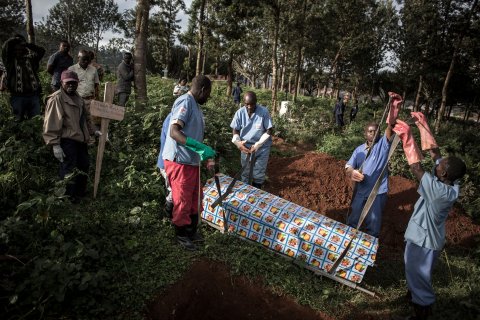 Health workers prepare to bury a coffin containing a victim of the ebola virus on May 16, 2019 in Butembo.JOHN WESSELS/AFP/GETTY
Health workers prepare to bury a coffin containing a victim of the ebola virus on May 16, 2019 in Butembo.JOHN WESSELS/AFP/GETTYIt hasn't helped that more than two weeks after the election, President Trump has still not conceded to President-elect Joe Biden, nor has the process of handing off the reins of government begun. The vaccine rollout that is expected to begin in December, assuming fast-track approval by the FDA, may be the most complicated public-health operation ever undertaken.
"I would liken this to driving a race car through an obstacle course, and in mid-course, you're going to change drivers," says Thomas Frieden, former director of the CDC and now CEO of Resolve to Save Lives, a non-profit.
The Trump administration, despite the post-election chaos, seems to have kept its focus on many of the logistical issues involved in distributing vaccines and all the refrigeration equipment they require across the country. But other challenges are getting short shrift, says Frieden. For instance, authorities will have to keep track of who's gotten what vaccines, who needs a second dose (most vaccines under development require two).
"We do a really bad job of that in this country already with adult vaccination," Frieden says. "Now we're trying to do it with everybody all at once."
Trust in health authorities has already taken a hit from false promises about hydroxychloroquine and blood plasma and the appearance of the FDA and the Centers for Disease Control and Protection buckling to pressure from the White House. If the U.S. botches the vaccine roll out whatever optimism now being engendered by the triumph of vaccine scientists could evaporate in a cloud of distrust. There are many points of failure.
The federal government is already stumbling on the issue of privacy. Software to track vaccinations and identify high-priority populations is being developed for the U.S. Department of Health and Human Services by Palantir, a data-mining firm. Officials as- sured the Wall Street Journal that Palantir will have no access to sensitive medical records.
But with trust at a low, will people believe it? Many Americans have shown themselves to be too skittish to answer questions during contact tracing. How many people will refuse vaccination for fear of having their names put into a government database? The administration hasn't made a clear case to the public why it can trust the government to handle their data, says Frieden. "Privacy must be sacrosanct, there can be no ambiguity about it," he says. "That's been a fumble for this administration."
One fear is that the prospect of imminent vaccines causes people to let down their guard and drop COVID precautions. COVID hospitalizations are expected to exceed 100,000 in the next three weeks. Deaths from COVID will hit 2,000 a day before the end of the year. By the time Joe Biden is inaugurated on January 20th, the death toll in the U.S. could be heading towards 400,000. Assuming people don't start canceling plans for family gatherings on Thanksgiving and Christmas, the numbers could be worse.
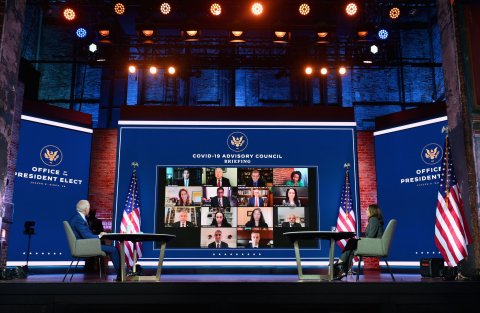 President-elect Joe Biden(L) and Vice President-elect Kamala Harris speak virtually with the Covid-19 Advisory Council during a briefing on November 9, 2020 in Wilmington, Delaware.ANGELA WEISS/AFP/GETTY
President-elect Joe Biden(L) and Vice President-elect Kamala Harris speak virtually with the Covid-19 Advisory Council during a briefing on November 9, 2020 in Wilmington, Delaware.ANGELA WEISS/AFP/GETTYOn the political front, the forecast is continuing turmoil and inaction at least for the next two months. Meanwhile, what hap- pens if the best-laid plans of Pfizer and Moderna, which combined promise 70 million doses by year's end, don't come to pass? Throw in a vaccine hiccup that delays rollout by weeks or months and it's not hard to see how the public could lose faith in the effort.
A Narrative Vacuum
Many developments of the past few months have bolstered confidence in the vaccine effort. Since the low point last summer, during what you might call the hydroxychloroquine phase, many of government experts at the CDC, the FDA and the National Institutes of Health, including Dr. Fauci, have pushed back against political interference. The FDA, for instance, refused to lower safety standards for a vaccine before the election.
Polls suggest that confidence in vaccines, which had dropped during this phase, picked up shortly after the election. Dr. Fauci survived the ordeal with his reputation intact, which may prove invaluable in assuaging the fears of the vaccine-hesitant.
To cement these gains and stave off conspiracy theories, the federal government should be engaged in an extensive communications effort, experts say. Washington should be keeping the public informed of the twists and turns in the vaccine effort and making a massive effort to forge ties with local communities to get the message out that vaccination is safe and important for everyone's health. This is not happening, however. "There are zero dollars allocated for it," says Yale's Omer.
Without engaging communities, the vaccine effort will be hampered, says Larson. Churches, neighborhood associations, local doctors and clinics and other groups are essential not only for getting out practical information about where to get the vaccines, but also to answer questions people tend to have that fact sheets from the CDC don't address. "We need to go into communities where there is skepticism and get engaged," she says.
People's concerns about vaccination tend to vary considerably depending on their own particular circumstances and points of view. For instance, a survey this fall found that only 17 percent of Black people in the U.S. said they would definitely get a coronavirus vaccine, even if scientists determined it was safe—despite the group's greater-than-average vulnerability to COVID.
Their skepticism may have roots in systemic racism in medical practices, including the infamous Tuskegee syphilis experiment—conducted in secret by the U.S. Public Health Service to study the progression of the venereal disease when left untreated—which ran from 1932 until a whistleblower came forward in 1972.
Persuading 85 percent of the population to take an mRNA vaccine is going to require outreach to a wide range of groups, including African Americans, Native American tribes, the elderly, religious groups, professional associations—just about every institution or association that people belong to. Such an effort starts at the top, by forging ties at the national level with institutions that have the trust of the communities they serve.
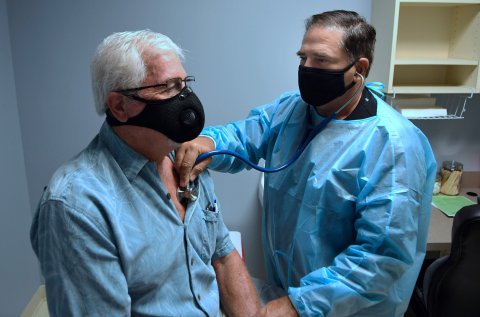 Older Americans are among the most vulnerable to COVID and have been part of the clinical trials, like Tony Potts, a 69-year-old retiree who has gotten the Moderna vaccine. Whether they can be widely persuaded to take a new vaccine when it comes out remains to be seen.PAUL HENNESSY/NURPHOTO/GETTY
Older Americans are among the most vulnerable to COVID and have been part of the clinical trials, like Tony Potts, a 69-year-old retiree who has gotten the Moderna vaccine. Whether they can be widely persuaded to take a new vaccine when it comes out remains to be seen.PAUL HENNESSY/NURPHOTO/GETTY"We need to talk with the heads of companies, who have a relationship with their employee base and in some cases have offices all around the world," says Larson. "We also need to be talking to religious leaders and local school teachers. Rather than tell them, here's the message, we need to understand what their issues are."
Even if the vaccine program isn't able to persuade enough people to get inoculated, the high degree of protection that the vaccines seem to be capable of should protect those who do elect to get vaccinated; those who do get sick will likely benefit from continuing improvements in treatments, which have already cut the death rate roughly in half. But so far data on trials has yet to be reviewed, and it's not clear yet how well the vaccines will cover specific groups of people. If significant pockets of people refuse vaccination, the coronavirus may hang around indefinitely.
"If you're part of a vulnerable group," says Roy Anderson, an epidemiologist at Imperial College in London, "the virus will always be in the back of your mind."
It's important to appreciate the astonishing achievement that the COVID vaccines represent for science and the medical professionals who have been working under intense pressure to deliver us from our pandemic nightmare. But science can only do so much.
No comments:
Post a Comment